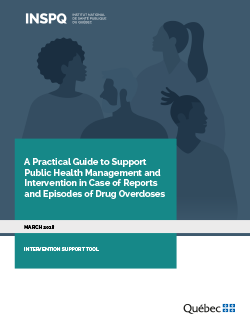A Practical Guide to Support Public Health Management and Intervention in Case of Reports and Episodes of Drug Overdoses
Tools :
- Overdose report form for health professionals
- Overdose report form for communitybased organizations
- Investigation questionnaire
Drug use is a current phenomenon creating concern among public authorities and the population. It represents an important public health issue because of the significant social and health impacts associated with it. Overdose, with or without death, is a serious health consequence of drug use. Throughout North America, overdoses are on the rise. This is part of a global trend in which the emergence of a large number of drugs and of highly potent drugs is being observed. Increased use of opioid medications, both for medical and non-medical purposes, is also associated with this trend.
In the United States, the rate of deaths from drug overdoses increased by 137% between 2000 and 2014, and by 200% for opioids alone. Drug induced deaths are now the leading cause of injury deaths in the United States, surpassing those caused by motor vehicles or firearms.
Canada is also experiencing a serious opioid-related overdose crisis. In 2016, there were 2,861 apparent opioid-related deaths in Canada.
In British Columbia, the drug overdose mortality rate doubled between 2010 and 2015, despite the province’s expansion of harm reduction services. Numbers continued to rise so significantly that in 2016 provincial authorities declared a public health emergency for the first time in their history. For purposes of comparison, the number of drug overdose deaths in this province in 2016 was over three times higher than the number of traffic fatalities that occurred in the previous year.
In Ontario, the rates of deaths due to drug and opioid overdoses have exceeded the rate of deaths due to motor vehicle collisions for several years, and the upward trend continues.
In Québec, the mortality rate due to opioid intoxication has been steadily increasing since 2000. Although in 2016 this rate was among the lowest in Canada, Québec is not immune to experiencing a crisis such as the one seen in western Canada. Thus, the Minister of Health and Social Services launched an epidemiological investigation in the spring of 2017, as provided for under the Public Health Act (PHA), based on the apprehended threat to the health of the population represented by opioid overdoses.
The Montréal and Québec City regions experienced episodes of excess overdoses in 2014 and 2015, respectively. These events led regional public health directors along with the department of health and social services (MSSS) to launch Québec’s first public health epidemiological investigations related to drug overdoses.
Given the increase in the number of overdoses and of episodes of excess overdoses, it is clear that we are facing the emergence of a real public health problem, which requires new cooperative efforts and the development of knowledge that extends beyond traditional public health practices. To respond to this need, it appeared necessary to better equip public health actors to manage such events, in accordance with the framework of their responsibilities.
This guide may help to reduce organizational delays and optimize the appropriateness of responses when an excess of overdoses occurs in a region. It is presented in the form of a practical guide in order to facilitate its assimilation and its use to support intervention in situations involving reports or episodes of drug overdoses. It will help guide action when overdoses are reported by providing a common understanding of various aspects related to preliminary analysis, investigation and intervention by public health.
This guide must be incorporated into a broader approach involving other public health functions (surveillance, health promotion, prevention), which exceeds the scope of this guide.
The guide begins by presenting the various actors who may be involved in the intervention process. The main body details the different aspects of the process undertaken by public health authorities: reporting, preliminary analysis, epidemiological investigation, intervention and evaluation. The appendices provide tools for reporting overdoses and conducting investigations as well as various types of information about potential partners.


